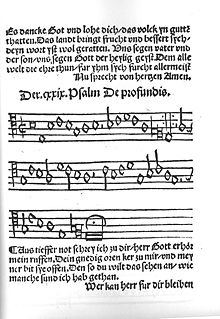Aus tiefer Not schrei ich zu dir
| "Aus tiefer Not schrei ich zu dir" | |
|---|---|
| Hymn by Martin Luther | |

"Aus tieffer not schrey ich zu dir" in the Erfurt Enchiridion, 1524
|
|
| English | From deep affliction I cry out to you |
| Text | by Martin Luther |
| Language | German |
| Published | 1524 |
"Aus tiefer Not schrei ich zu dir" (From deep affliction I cry out to you), originally "Aus tieffer not schrey ich zu dir", later also "Aus tiefer Noth schrei' ich zu dir", is a Lutheran hymn of 1524, with words written by Martin Luther as a paraphrase of Psalm 130. It was first published in 1524 as one of eight songs in the first Lutheran hymnal, the Achtliederbuch, which contained four songs by Luther, three by Paul Speratus, and one by Justus Jonas, and also appeared the same year in the Erfurt Enchiridion. It is part of many hymnals, also in translations. The text inspired vocal and organ music from the Renaissance to contemporary, including composers such as Johann Sebastian Bach, who based a chorale cantata on it, Felix Mendelssohn and Max Reger.
Luther paraphrased Psalm 130 as his first attempt to make the psalms accessible to Protestant church services in German. He transformed, likely in 1523, the Latin penitential psalm De profundis into a hymn. Luther sent it as a sample to encourage Protestant colleagues to write psalm-hymns for use in German worship. A version in four stanzas first appeared in 1524 in Nuremberg in Etlich Cristlich lider (Some Christian songs), also called Achtliederbuch, the first Lutheran hymnal. The same year it appeared in Erfurt in Eyn Enchiridion. A version in five stanzas, with the ideas of stanza 2 as two stanzas developing the theme of "grace alone" more fully, was first published in 1524 in Wittenberg in Eyn geystlich Gesangk Buchleyn. Scholars debate if the shorter version is actually Luther's, or reduced by an editor from the longer version.
...
Wikipedia
